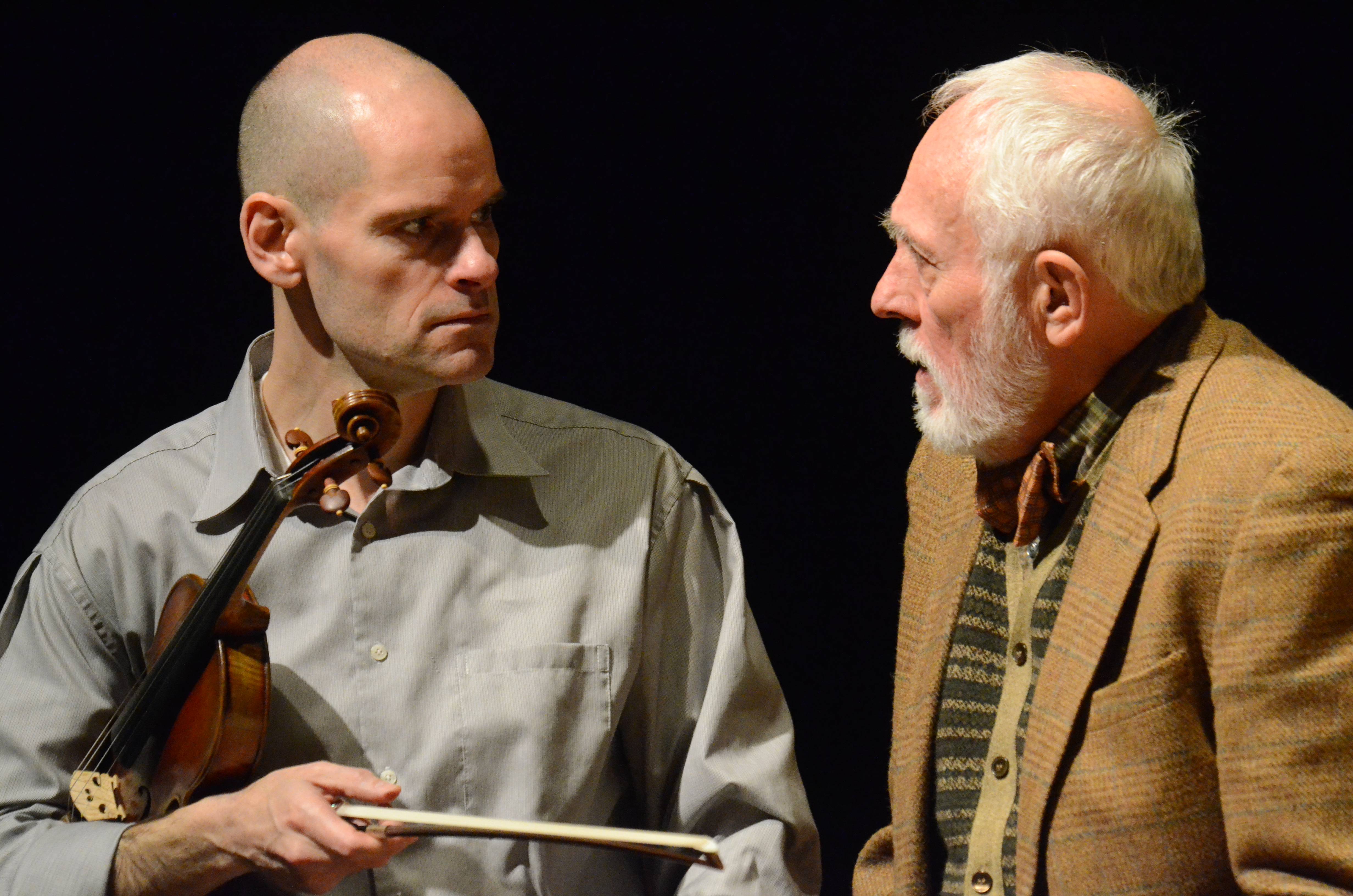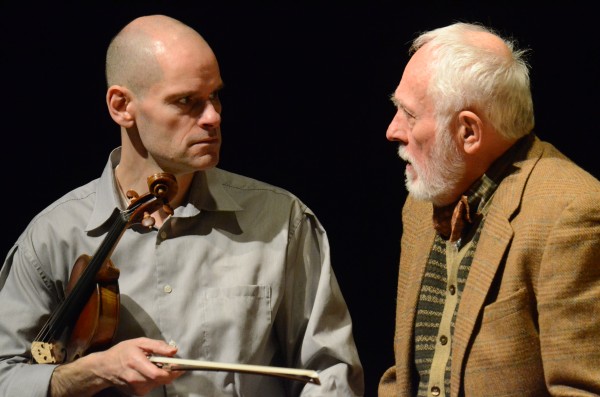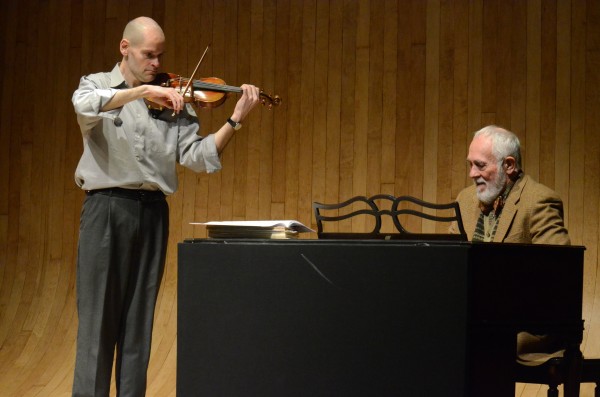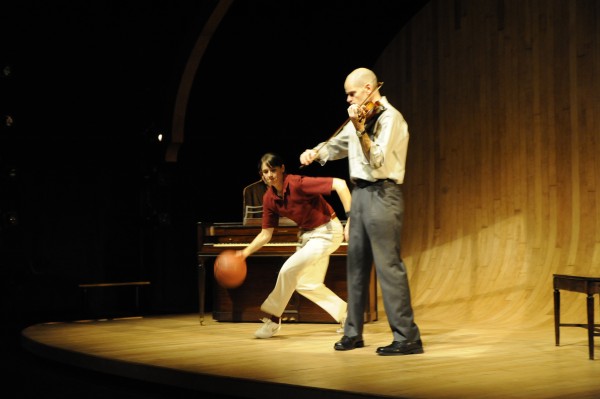
12 Jan Tall Tales: “Charles Ives Takes Me Home,” Curious Theatre
“Charles Ives Takes Me Home,” Denver’s Curious Theatre. Tickets here.
The program for “Charles Ives Takes Me Home” tells us that the setting is “Here and There” and the Time is “Now and Then.”
We are heading for a trip to universal messages, we figure, big-picture stuff. And then the trio of introductions that begin the play set the off-beat, quirky mood that permeates this intriguing, brisk play at the Curious Theatre. The fourth wall is shattered from the get-go.
First, we meet Charles Ives (Jim Hunt) who walks down the side aisle, hops up on the stage, doffs his hat with an avuncular twinkle in his eye and makes a few announcements, including the customary caution for audience members to silence mobile devices. This greeting is followed by a series of odd but heartfelt “thank you” notes. Among them: “Thank you for chuckling at any and all attempts at comedy. Thank you for your comedy. For the great folly that you are.”
Ives invites us to watch the play and even tells us that it will run a mere 75 minutes. And we’re off. Ives heads, for now, to the shadows and the sidelines, to observe.
Next we meet Laura Starr (Kate Berry), an obsessed basketball coach who is in the middle of a trying to rally her troops at half time of their first game. The game, to put it mildly, is not going well. Intensity is lacking. She mocks, cajoles, berates, belittles, coaches, pinches and smacks (verbally) her players around—all while bouncing a basketball for punctuation. (The dribbling basketball in this play is almost the fourth major character; Laura is rarely without it. A brilliant device by the playwright, Jessica Dickey.)
And finally we meet John Starr (Dave Belden), Laura’s father. He is as obsessed with the violin and his musical career as his daughter is to the game of basketball. With a permanently clenched jaw, he dismisses her game as nothing more than tape on the floor and a basket in the air and, as the play shows us snippets of earlier father-daughter interactions, we soon realize that this play is Music vs. Sports, Violin vs. Basketball and one man’s inability to get behind his daughter’s dreams or recognize the many ways in which they could bond.
So where does Charles Ives come in?
It turns out John Starr was the beneficiary of a single one-on-one session with the radical composer Ives, who was known for maverick musical mash-ups and an amateur athletic career. Ives wants to jolt our sensibilities. He derides comfortable music, the “ta-ta” of predictability and routine. He talks to us about how to listen for inspiration, even at a baseball game. His speeches invoke the secrets of the universe and our primordial selves. He urges John to understand his place in the natural course of events as one generation gives way to the next.
The play requires double-duty from Belden, as actor and virtuoso. Belden’s performance is slam-dunk good. He’s hard-edged and irascible around his daughter and then the eager, wide-eyed pupil around Ives—all while playing his violin, including some tricky bits from “Concord Sonata” and other Ives pieces that seek to bend your ear and sensibilities.
Berry also shows ample range, going from a 10-year-old throwing a pleading tantrum to attend basketball camp (a hilarious scene) to a grown-up coach trying to get her troops in gear. Kudos to her dribbling skills, too.
Jim Hunt plays Ives with an easy-going sparkle. If anything, I wish the script gave us more time to get to know Ives and a few more sections where we could hear his music stretch out. I wanted more of Ives’ philosophy and his process, though we are offered a few juicy glimpses.
In the face of Ives’ deep-meaning views of humanity and art, both Laura and John are given a few crude, funny lines that counter any hint that the play might trip out on itself. You’ll know right from John’s opening self-introduction that Dickey is in complete control of every moment. We learn much about John’s focused and simple character from his opening declaration that he has a deep love of tits (a theme that recurs). And Laura earns a solid laugh for her urging her team to get out there and “kick some pussy.” We see that her obsessions are just as self-absorbed as her father’s.
The spare, beautiful set (Susan Crabtree) is another Curious Theatre masterpiece, including the multi-purpose piano, which doubles as a blackboard for diagramming basketball plays, in one instance, and a lesson about music in another. Nifty. And the play’s steady energy never sags under the zippy pace set by director Christy Montour-Larson
I left wanting more Ives and, perhaps, wanting to know more precisely how John Starr does, and does not absorb the lessons of this lively, interesting composer known for his unique view of the world—and humanity.
This is a stimulating 75 minutes of theater, packed with energy and wit.
Mark Stevens
Editor’s note: Telluride Inside… and Out’s monthly (more or less) column, Tall Tales, is so named because contributor Mark Stevens is one long drink of water. He is also long on talent. Mark was raised in Massachusetts. He’s been a Coloradoan since 1980. He’s worked as a print reporter, national news television producer, and school district communicator. He’s now working in the new economy and listed under “s” for self-employed. Mark has published two Colorado-based mysteries, “Antler Dust” (2007) and “Buried by the Roan” (2011). Midnight Ink will publish the third book, “Trapline,” in the fall of 2014 and is under contract for a fourth book in the series, too. For more about Mark, check out his website.






Sorry, the comment form is closed at this time.